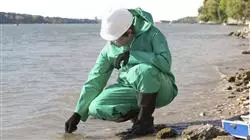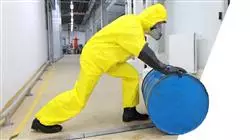University certificate
Accreditation/Membership
The world's largest faculty of engineering”
Introduction to the Program
This Master's Degree will give you the boost you are looking for to grow in Environmental Engineering. Take action and enrol now"

In recent years, human beings have been facing major environmental challenges caused by the effects of pollution from all economic sectors, the disappearance of species, the shortage of natural resources and climate change. The actions taken by organizations and governments around the world to maintain the natural balance have promoted Environmental Engineering. This specialty has thus become a key tool for the development of projects to reverse a situation that has been unsustainable up until now.
Cleaning microplastics from the seas using the latest technology, reducing environmental pollution of soils using the most sophisticated decontamination techniques, the creation of new biodegradable materials or the transformation of the very concept of economy are some of the initiatives that have been launched. In this scenario, the professional engineer has a great opportunity to contribute their extensive knowledge and generate new projects that represent a before and after in environmental protection. For this reason, graduates of this Master's Degree in Environmental Engineering will have the opportunity to receive advanced teaching through innovative multimedia resources in accordance with current academic standards.
Students will follow a 12-month program that will further develop their knowledge of soil science, management systems and environmental impact assessment, as well as the techniques and tools necessary to implement projects in this sector. In addition, students will learn about the different environmental policies that are being implemented and the relevance of social awareness of the environment.
All this, in a program taught exclusively online, which can be accessed 24 hours a day from a computer or Tablet with internet connection. In addition, students have the freedom to distribute the course load according to their needs, which allows them to have more flexibility and facilitates the compatibility of a university degree with their professional and/or personal responsibilities.
The environmental challenges we face are diverse: climate change, pollution, habitat destruction, shortages of natural resources, waste etc. Unrestrained development and uncontrolled exploitation of resources are the cause of all these problems, and to tackle them we need professionals who know how to face these challenges.
Stand out in a sector that demands highly qualified engineers with a strong environmental awareness"
This Master's Degree in Environmental Engineering contains the most complete and up-to-date program on the market. The most important features include:
- The development of case studies presented by experts of Environmental Engineering
- The graphic, schematic, and practical contents with which they are created, provide scientific and practical information on the disciplines that are essential for professional practice
- Practical exercises where the self-assessment process can be carried out to improve learning
- Its special emphasis on innovative methodologies
- Theoretical lessons, questions to the expert, debate forums on controversial topics, and individual reflection assignments
- Content that is accessible from any fixed or portable device with an Internet connection
Implement your ideas and initiatives to care for the environment thanks to the knowledge you will gain during this program"
The program includes, in its teaching staff, professionals from the sector who bring to this program the experience of their work, in addition to recognized specialists from prestigious reference societies and universities.
The multimedia content, developed with the latest educational technology, will provide the professional with situated and contextual learning, i.e., a simulated environment that will provide immersive education programmed to learn in real situations.
This program is designed around Problem-Based Learning, whereby the professional must try to solve the different professional practice situations that arise during the academic year For this purpose, the student will be assisted by an innovative interactive video system created by renowned and experienced experts.
Delve into current environmental policies and the new concept of sustainable economy"

Acquire the necessary techniques to understand soil quality, the repercussions of waste on the soil and the solutions provided by engineering"
Why study at TECH?
TECH is the world’s largest online university. With an impressive catalog of more than 14,000 university programs available in 11 languages, it is positioned as a leader in employability, with a 99% job placement rate. In addition, it relies on an enormous faculty of more than 6,000 professors of the highest international renown.

Study at the world's largest online university and guarantee your professional success. The future starts at TECH”
The world’s best online university according to FORBES
The prestigious Forbes magazine, specialized in business and finance, has highlighted TECH as “the world's best online university” This is what they have recently stated in an article in their digital edition in which they echo the success story of this institution, “thanks to the academic offer it provides, the selection of its teaching staff, and an innovative learning method aimed at educating the professionals of the future”
A revolutionary study method, a cutting-edge faculty and a practical focus: the key to TECH's success.
The most complete study plans on the university scene
TECH offers the most complete study plans on the university scene, with syllabuses that cover fundamental concepts and, at the same time, the main scientific advances in their specific scientific areas. In addition, these programs are continuously being updated to guarantee students the academic vanguard and the most in-demand professional skills. In this way, the university's qualifications provide its graduates with a significant advantage to propel their careers to success.
TECH offers the most comprehensive and intensive study plans on the current university scene.
A world-class teaching staff
TECH's teaching staff is made up of more than 6,000 professors with the highest international recognition. Professors, researchers and top executives of multinational companies, including Isaiah Covington, performance coach of the Boston Celtics; Magda Romanska, principal investigator at Harvard MetaLAB; Ignacio Wistumba, chairman of the department of translational molecular pathology at MD Anderson Cancer Center; and D.W. Pine, creative director of TIME magazine, among others.
Internationally renowned experts, specialized in different branches of Health, Technology, Communication and Business, form part of the TECH faculty.
A unique learning method
TECH is the first university to use Relearning in all its programs. It is the best online learning methodology, accredited with international teaching quality certifications, provided by prestigious educational agencies. In addition, this disruptive educational model is complemented with the “Case Method”, thereby setting up a unique online teaching strategy. Innovative teaching resources are also implemented, including detailed videos, infographics and interactive summaries.
TECH combines Relearning and the Case Method in all its university programs to guarantee excellent theoretical and practical learning, studying whenever and wherever you want.
The world's largest online university
TECH is the world’s largest online university. We are the largest educational institution, with the best and widest online educational catalog, one hundred percent online and covering the vast majority of areas of knowledge. We offer a large selection of our own degrees and accredited online undergraduate and postgraduate degrees. In total, more than 14,000 university degrees, in eleven different languages, make us the largest educational largest in the world.
TECH has the world's most extensive catalog of academic and official programs, available in more than 11 languages.
Google Premier Partner
The American technology giant has awarded TECH the Google Google Premier Partner badge. This award, which is only available to 3% of the world's companies, highlights the efficient, flexible and tailored experience that this university provides to students. The recognition as a Google Premier Partner not only accredits the maximum rigor, performance and investment in TECH's digital infrastructures, but also places this university as one of the world's leading technology companies.
Google has positioned TECH in the top 3% of the world's most important technology companies by awarding it its Google Premier Partner badge.
The official online university of the NBA
TECH is the official online university of the NBA. Thanks to our agreement with the biggest league in basketball, we offer our students exclusive university programs, as well as a wide variety of educational resources focused on the business of the league and other areas of the sports industry. Each program is made up of a uniquely designed syllabus and features exceptional guest hosts: professionals with a distinguished sports background who will offer their expertise on the most relevant topics.
TECH has been selected by the NBA, the world's top basketball league, as its official online university.
The top-rated university by its students
Students have positioned TECH as the world's top-rated university on the main review websites, with a highest rating of 4.9 out of 5, obtained from more than 1,000 reviews. These results consolidate TECH as the benchmark university institution at an international level, reflecting the excellence and positive impact of its educational model.” reflecting the excellence and positive impact of its educational model.”
TECH is the world’s top-rated university by its students.
Leaders in employability
TECH has managed to become the leading university in employability. 99% of its students obtain jobs in the academic field they have studied, within one year of completing any of the university's programs. A similar number achieve immediate career enhancement. All this thanks to a study methodology that bases its effectiveness on the acquisition of practical skills, which are absolutely necessary for professional development.
99% of TECH graduates find a job within a year of completing their studies.
Master's Degree in Environmental Engineering
Prepare to become an expert in environmental protection and preservation with TECH Global University's Master's Degree in Environmental Engineering. Our online classes offer you the opportunity to acquire the knowledge and skills necessary to meet today's environmental challenges. In a world increasingly aware of the importance of sustainability, the demand for environmental engineering professionals has grown significantly. Our Master's Degree program will provide you with a comprehensive education in key topics such as natural resource management, environmental impact assessment, pollution control and environmental law.
TECH always thinks about the evolution of its students
One of the advantages of our online classes is flexibility. You will be able to access the course content from anywhere and adapt your study schedule to your daily routine. In addition, you will have the support of expert teachers who will guide you throughout your learning. During the Master's Degree, you will have the opportunity to apply your knowledge through case studies and real projects. You will learn to develop innovative and sustainable solutions to address current environmental challenges, and you will be prepared to face future challenges in the field of environmental engineering. Upon successful completion of the program, you will receive a degree recognized by TECH Globall University, which will support your skills and knowledge in environmental engineering. This recognition will open doors to various career opportunities in government agencies, private companies and non-governmental organizations committed to environmental protection. Don't miss the opportunity to make a difference and contribute to the care of the planet. Enroll in our Master's Degree in Environmental Engineering and acquire the necessary tools to be a leader in the search for sustainable solutions for our environment.







